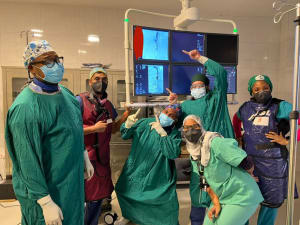Demand for minimally invasive treatments continues to rise around the world. Interventional radiology (IR) in particular is indicated for a broad range of conditions and has numerous advantages over more traditional surgical options, often significantly decreasing associated morbidity and mortality. Examples include image guided abscess drainage, nephrostomy and biliary tube placement, uterine fibroid embolization, and embolization in the setting of trauma, GI bleed, or postpartum hemorrhage. However, many low income countries have limited or complete lack of IR services. According to the WHO over 4 billion people globally lack access to diagnostic imaging, with likely more than 5 billion lacking access to IR. As of 2017, there was not a single interventional radiologist in Tanzania, leaving a population equivalent to that of California and New York combined without access to a broad range of life-saving treatments. Over the past four years, the “Tanzania Interventional Radiology Initiative” has initiated East Africa’s first IR training program, training the first generation of interventional radiologists in the country. Africa’s first Master of Science in IR curriculum at Muhimbili University in Dar es Salaam was officially announced in October 2019 ( https://medicine.yale.edu/news-article/yales-tanzania-interventional-radiology-initiative-approved-for-msc-program/ ), which gives testament to the rapid progression of the training program. An overview of the program was published in the Journal of Vascular and Interventional Radiology in 2019 ( https://www.jvir.org/article/S1051-0443(19)30687-6/pdf ).
Ultimately, I would like to go on this trip to contribute to its growth, while learning the necessary skills and logistics needed to help re-create this model in other underserved areas.
While this program most immediately serves the 60 million people living in Tanzania, training IR physicians locally will have regional impact. A graduate of this program has recently returned to Rwanda as an IR physician. Another trainee will be returning to Nigeria. Hopefully we can create this model in other areas, including Sri Lana
The impact of outreach in Interventional Radiology cannot be understated. Minimally invasive techniques that spare open surgery, or where open surgery cannot be routinely performed, can be extremely valuable to patients. Women, for instance, with debilitating fibroids in Tanzania should be offered a treatment that does not require surgery. By training residents here, I hope to aid in the growth of IR across the continent, so every country will have at least one IR center where patients can receive minimally invasive therapy. On a personal note, I would like to dedicate more time and energy to this type of work in the future. I believe that this will give me great experience, and allow me to build to other places. My ultimate goal is to recreate such a training program in Northern Sri Lanka.






The Doximity sponsored trip to Tanzania was fantastic. I worked with Road2IR, who are establishing the first training program for IR in Africa. I was able to train 11 trainees in Vascular and Interventional Radiology, and watching them absorb the knowledge and apply it real time was fulfilling. Also, we were able to offer complex medical care to patients in a medical system where such services are not routinely offered. We performed a TIPS on a young man who had life threatening hemorrhage, a renal artery stent in a patient with a threatened transplant, intra-arterial chemotherapy, and much more. Ultimately, the person most impacted by the trip was me - connecting with such a humble and appreciative group of trainees and patients is something I will be forever thankful for.